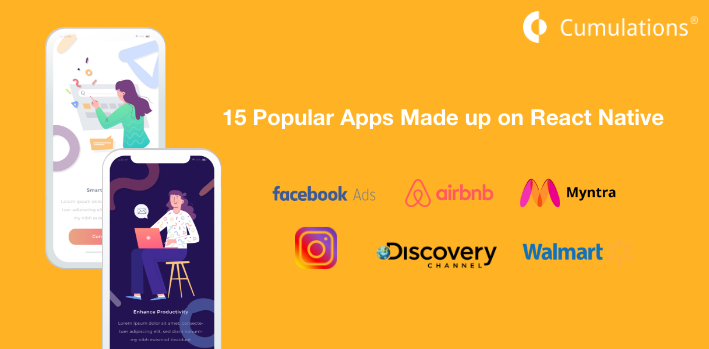
With over 2.7 billion smartphone users across the globe, the mobile app industry is one of the most, if not the most, prosperous industry. Smartphone infiltration and app usage is mounting at a steady rate, without showing any signs of slowing down in the anticipatable future.
Mobile marketing has become a crucial part of any promotion strategy. Today, people bank on their mobile devices to carry out almost every activity. Thus, any organization that is not capitalizing on this global trend seems to be fairly out of touch.
Earlier, an increasing number of organizations relied upon a fully native app meant for one targeted platform to provide an interactive experience to the users. But with the sophistication of technology, we have reached a point where 50 percent of the mobile apps that we come across today are hybrid.
With this evident market domination of hybrid applications, we feel that this is a great time and platform to look at the benefits of this hybrid app development approach. At the same time, we will also point out the main drawbacks in order to get a clear picture of their role in the mobile market. But first, let’s begin with understanding what a hybrid application is.
What are Hybrid Mobile Applications?
Also known as cross-platform apps, hybrid apps are those which are compatible with more than one browser. These apps are developed using web technologies like HTML5, JavaScript and CSS3. After that, they are wrapped in the native code for a close integration with the device to pass itself off as a transfer app.
Essentially, hybrid apps are web apps covered in a native web view which are displayed through the device’s native browser. These apps are installed on a device, just like any other app.
So, hybrid apps possess elements from native apps, which are developed for a specific platform as well as elements from web apps, which are websites, that act as apps and are directly accessed via a browser.
Benefits of Hybrid Apps
A lot of businesses are preferring hybrid apps over native and web applications owing to its multifarious benefits. Some of the most prominent ones are as follows:
1. Cohesive Development
This is by far the greatest advantage of hybrid app development approach. These apps eliminate the need for developing and maintaining different codes for different platforms. Simply preparing a single version of the app and then using your choice of hybrid framework to do the heavy lifting ensures that everything works flawlessly.
Hybrid apps bring down the development cost substantially as well as shorten the project development cycle, resulting in greater revenue. A number of small businesses wouldn’t be able to target all major mobile platforms, if it wasn’t for hybrid frameworks.
2. Quick Deployment
If a business is launching a Minimum Viable Product (MVP), it is imperative that the product reaches the market first to gain a competitive advantage over its competitors. With hybrid apps, the app development cycle becomes comparatively shorter, making it possible to quickly deploy the apps across the App Stores.
3. Cost-Effective Approach
Although native applications provide an incredible look and feel, yet they are one of the most expensive options. Basic web apps, on the other hand, cut from the smartphone’s OS and built-in functionalities. Even though they are getting smarter every day, they still cannot match the experience offered by a native application.
Hybrid applications serve as a middle ground between the two approaches. These apps offer all the added functionality with very little overhead cost. This gives the hybrid app developers adequate freedom to experiment and come up with newer features at a much more cost-effective price.
4. Offline Support
Hybrid apps can be developed in either connected or offline mode. This enables the businesses to maintain dual profiles: one for the users who are continuously online, and second for the ones with broken connectivity. This offline capability of hybrid apps gives it a definite edge over web apps which are disparagingly limited by their lack of offline support.
5. Targets a Wider Audience Base
Because hybrid apps can be used on a huge range of devices, it enables businesses to target a much wider base of audience. These apps can operate on all modern smartphones, whether they have an Android or iOS operating system installed. This can dramatically increase the number of prospective users, leading to improved revenue.
6. Minimum Requirements
A hybrid app can be developed by using minimum requirements. In case of hybrid app development, there is no need to learn separate languages. These apps feel a lot like native apps, and can be simply created by using one language, i.e. C# supported with a good hybrid framework.
Must read: Why Flutter is the Best Platform to make Hybrid Apps
Limitations of Hybrid Apps
Although the benefits of hybrid apps are tremendous, they are also limited in some critical ways. Following are some disadvantages that you must consider before opting for hybrid app development.
1. Performance
Hybrid apps have an additional layer between the codebase and the targeted mobile platform. This layer is that of the hybrid mobile frameworks, such as PhoneGap, Ionic, Cordova, etc. This added layer can sometimes result in degraded performance.
This potential loss of performance can be a major problem with large-scale applications. After all, Facebook shifted their mobile application from HTML5 to native due to subsequent performance issues of the app.
2. Debugging
The additional layer of hybrid framework also makes the process of debugging immensely hard. The app developers have to rely on the framework itself to work well with the platform and not create any glitches or bugs. Also, most hybrid app developers do not possess an in-depth knowledge of the targeted platform, which makes it hard for them to detect the issue.
3. Limited User Interface
With hybrid apps, it becomes almost impossible to reach the full potential of platforms. These apps do not give the real feel of native apps and their user interface is not very consistent. This is because these apps use WebView which does not allow the users to exploit the full potential of the device. Also, moving from one page to another takes too much time, making the users lose their interest in the app.
4. An Extensive QA Testing Procedure
The testing process for hybrid apps is much more extensive since these apps must be compatible with a wide range of operating systems. Consequently, the QA team will have to evaluate the app’s performance in different operating system environments to ensure that it works seamlessly across all platforms.
The testing process may also be slightly more complicated as the developers might encounter scenarios where addressing a bug on one platform triggers an issue when the app is used on another platform.
Wrapping Up
Hybrid app development approach is most suitable in situations where fast development is the main criterion. It is also feasible in times when the heavy cost of developing native applications would be out-and-out exorbitant.
Big and established companies that cannot afford to compromise on the app stability and performance must opt for native applications. Startups and small-medium sized organizations, on the other hand, can kick start their app journey with a smart hybrid application. After all, it might be just a matter of time before the hybrid app development frameworks reach their full potential that all the downsides of these apps simply disappear.
Also read: Hybrid vs Native Mobile App Development: which one you should choose in 2020


 +91-984-5825982 | +91-996-4689921
+91-984-5825982 | +91-996-4689921 sales@cumulations.com
sales@cumulations.com Send your requirement
Send your requirement 



